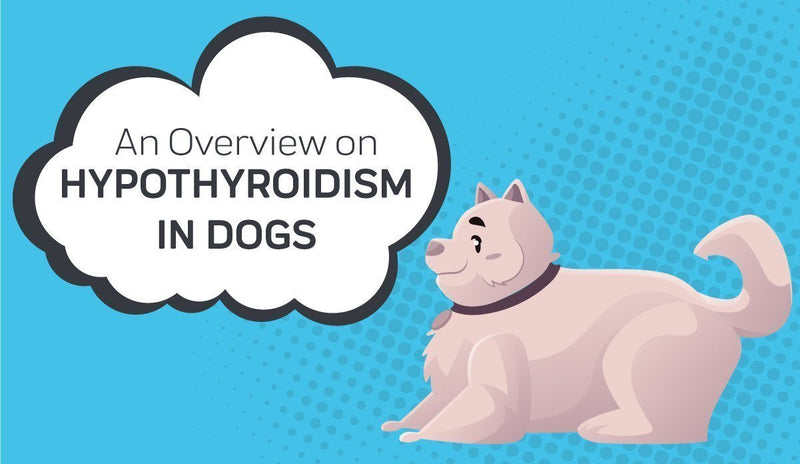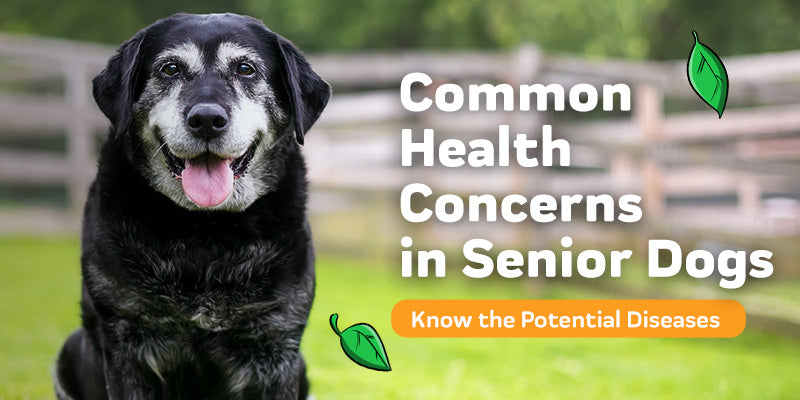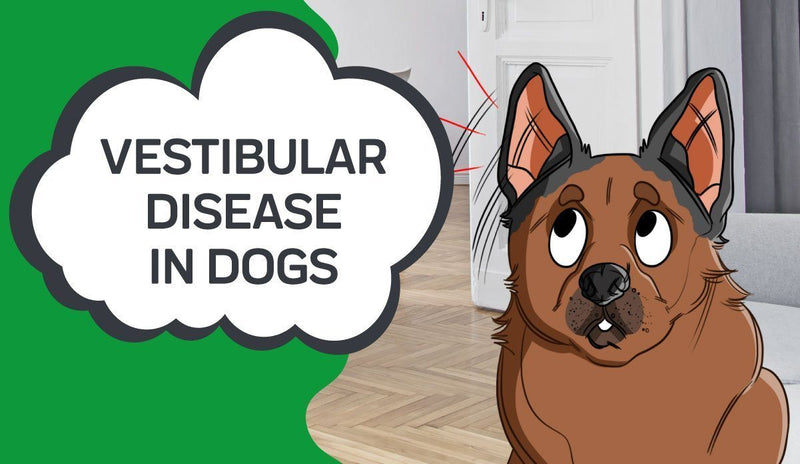- What Is Hypothyroidism in Dogs?
- Are Certain Breeds Prone To Hypothyroidism?
- Causes of Hypothyroidism in Dogs
- What Are Symptoms of Hypothyroidism in Dogs?
- How Does Hypothyroidism in Dogs Get Diagnosed?
- Can Hypothyroidism in Dogs Be Treated? ; The Thyroid Hormone
- Are There Natural Treatments For Hypothyroidism in Dogs?
- What Else Can I Do For My Dog With Hypothyroidism?
Our furry friends are like a part of the family. They are special and have their own unique personalities and needs. If your furry pal is experiencing a significant weight gain, it is easy to understand why you may be concerned. A significant weight gain that is happening with no major changes in eating habits or exercise habits can be an indicator of hypothyroidism in dogs.
Hypothyroidism in dogs is even more likely if your pet is more tired than usual and is urinating more frequently. These symptoms can be slightly alarming for pet parents and it is possible that your dog has hypothyroidism. We will go over the symptoms of dogs with hypothyroidism and various other general information that can help you with pet health.
What Is Hypothyroidism in Dogs?
Hypothyroidism in dogs is when they have an underactive thyroid function. The thyroid is not acting in the way that it should be and it is not performing the way it needs to for a healthy metabolism and body function. Many people have heard of human beings having hypothyroidism. Unfortunately, our dogs can have it as well.
The science behind hypothyroidism all starts in the thyroid gland. The thyroid gland is found in the throat and is regulated by the pituitary gland in the brain. The pituitary gland instructs the body on how to regulate the hormones and essential body functions controlled by the thyroid. The importance of the thyroid gland and its functions is vast. It regulates how the body runs metabolically and also controls growth as thyroid hormones help with the development of the body.
As you can see, it is an essential gland in the body and a dog that has a thyroid gland that is not performing properly may not have enough energy. They may not be converting calories correctly and may not be growing or developing properly.
This is the opposite of hyperthyroidism. Hyperthyroidism is when the body is overly producing the thyroid hormones that it is responsible for, and one of the most common side effects is weight loss that is significant. Indeed, it produces the opposite effect of hypothyroidism. In summation, hypothyroidism is the lack of production of thyroid hormones and hyperthyroidism is when the body is producing more thyroid hormones than it should.
The most common reason for hypothyroidism in dogs is a disease called lymphocytic thyroiditis. This is a disorder that causes the body to attack the thyroid gland. Inflammation of the thyroid can also cause hypothyroidism. In addition, it is possible that a tumor is affecting the thyroid gland. There are also other reasons that are congenital in nature that can cause this health condition in dogs.
For example, this can be caused by having a spayed or neutered pet. Also, dogs that are older are susceptible to having an under-performing thyroid gland. As you can see, your dog could develop hypothyroidism for a number of reasons. The good news is that your veterinarian can likely diagnose this condition quite easily. Pet parents will be glad to know that there are treatment options that are quite effective in correcting or improving hypothyroidism in dogs. That will be gone over in detail further along in the article.
Are Certain Breeds Prone To Hypothyroidism?
There is truth to the statement that certain breeds of dogs are more prone to hypothyroidism.
It is most common in dogs that are of the following breeds:
- Cocker spaniels
- Golden and Chocolate Labradors
- Irish setters
- Boxers
- Rottweilers
The breed most susceptible to hypothyroidism in dogs is retrievers. Interestingly, a very high percentage of this breed develops hypothyroidism. Pet parents of retrievers should keep an eye out for signs and symptoms of this thyroid condition.
Causes of Hypothyroidism in Dogs
Some of the causes of hypothyroidism in dogs are not things that can be controlled. It is often from a health condition that can originate in many ways. There is often no particular reason a dog develops hypothyroidism.
However, there is the chance that environmental factors could be causing your pooch to develop this thyroid disease. It is possible that if you smoke cigarettes around your pet or if they have a lack of selenium in their diets, they could be more prone to hypothyroidism. Highly processed and low-quality foods can also have an effect on their thyroid gland and production. Corticosteroids can cause problems with the thyroid and disrupt the body's normal function and metabolism. These environmental issues could be causing your pet to suffer from hypothyroidism.
Usually, the cause of hypothyroidism is from an underlying health condition.
Sometimes these conditions are congenital or genetic, and this cannot be helped. Other times, it is breed-specific and very common. Additionally, some cancers and health conditions that arise can cause this to occur. It is a metabolic disorder that can affect the entire body.
What Are Symptoms of Hypothyroidism in Dogs?
The Clinical signs of hypothyroidism vary. They can also mimic the symptoms of other health problems. The good news is that the veterinarian of your choice can help with the diagnosis of hypothyroidism underlying problem. One dog may not experience the same symptoms that another dog does. We have a short hypothyroidism symptoms checklist below for pet parents to check.
Clinical Signs of hypothyroidism in dogs are:
- Brittle coat
- Rapid or significant weight gain
- Low energy and low moods
- Dry coat or fur
- Low tolerance for colder temperatures
The most noticeable symptom is usually rapid weight gain. For example, a dog that hasn't increased their food intake and yet is gaining weight quickly could have hypothyroidism. Some dogs may begin to have thickening of the skin. Sometimes, thyroid problems in dogs can occur due to cancer or tumor growth. Tumors or cancers that affect the thyroid are usually near the thyroid gland in the throat.
Pet parents may notice a lump around the throat. However, there are some internal tumors and cancers that cannot be seen by merely glancing.
Clinical Signs that a pet could have thyroid cancer or tumors are a dog that is experiencing a much lower appetite, hoarseness, coughing, or a weak bark.
If you suspect that your dog has a tumor or cancer, it is vital to take them immediately to your trusted veterinarian. They will be able to assess them and run any tests that they deem necessary. An emergency visit to the veterinarian may be necessary to speed up any diagnosis and treatment for your dog's best chance at health if indeed they do have cancer or a tumor.
How Does Hypothyroidism in Dogs Get Diagnosed?
Initially, hypothyroidism in dogs may not be noticeable to the pet parent. It can progress slowly at the beginning and take time to truly manifest itself in a way that makes it apparent. However, it may get worse over time and symptoms may begin to get worse. For example, you may notice mood changes, hair loss, bloating in the face, hormonal imbalance, infections, and more.
Getting a diagnosis of hypothyroidism in dogs starts off by reporting the relevant symptoms to your veterinarian. Let your trusted vet know the signs and symptoms of thyroid disease issues that you have noticed. They will likely want to give your pet a thorough examination. Blood tests for total thyroxin hormone (T4) is the most common test for low thyroid problems in dogs. The total thyroxin level measures this thyroid hormone as a blood sample. They will look for low levels of thyroxin in the blood. For a definitive diagnosis, a free T4 test will be conducted. Low results on the free T4 thyroid hormone levels will confirm a diagnosis of hypothyroidism. It is possible that your veterinarian will want to conduct further testing. It is vital to listen to the advice of your veterinarian.
Can Hypothyroidism in Dogs Be Treated? ; The Thyroid Hormone
The good news is that hypothyroidism is treatable. Dogs are given a replacement thyroid hormone prescription by their vet. The vet will recommend an amount to be given daily. When a month has passed, the thyroid hormones will be tested again to determine if the amount has been working well enough to help the dog's thyroid function get to normal. The vet will determine if their dosage needs to be changed based on the results of the blood tests. After the initial month, a follow-up visit every six months is recommended to ensure that the treatment is still working. At times, the dog's body may adjust to the thyroid hormone replacement medication and need to be changed to compensate for that. This is why testing is repeated on a bi-annual basis.
Also, too much thyroid hormone medication for dogs can affect them negatively. Too high of a dose can cause hyperthyroidism in dogs. Hyperthyroidism in dogs will result in weight loss, insomnia, and excessive thirst. This is why there are visits to check their thyroid levels every six months. If you notice that your dog is showing signs of hyperthyroidism, then you should get them to the vet right away.
Hypothyroidism in dogs can be treated effectively with the correct dosage of thyroid hormone replacement medication. Thyroid replacement medication should be given as directed. This is to protect the health of your pet and ensure that they get better. Dogs that are taking thyroid replacement medication should start to see some improvements within four to six weeks. For example, you may notice that your dog's fur will begin to look healthier and their hair will start to grow back. They may start to get more energy, and that is a good sign that the medication is doing its job.
Pet parents that have been distressed at seeing their normally active pet become lethargic will be relieved to notice a return to energy in their canine. They should be more interested in outdoor activity, exercise, and playing. Another sign of improvement is that their weight may start to go back down. If your pet has been overweight as a result of hypothyroidism, this will be a big relief. Their weight should slowly begin to go down. At the very least, the rapid weight gain should have stopped, and their weight should be steady. Overweight pets can begin to have other health conditions, and this is another big reason why pet parents should get canine hypothyroidism treated right away. Dogs that have a high BMI could start to have health problems like diabetes, high cholesterol, and heart disease. Thyroid hormone replacement medication can help lower their weight and lessen the chances that they could develop some of the serious health problems that accompany being overweight. So, the proper medication and dosage can help with normalizing their thyroid hormone function and assist in bringing their weight down to an acceptable level for optimum health.
Are There Natural Treatments For Hypothyroidism in Dogs?
If your dog is a big treat fan, you may want to consider giving them Hemp Dog Treats. They are made in various flavors so that you can pick one that you know your dog will love. This way, your furry pal will get a tasty treat and the benefit of amazing health benefits that have zero side effects. It is an all-natural option that can really improve a pet's overall health and well-being. The fact that there are no known side effects can give pet parents peace of mind. Hypothyroidism in dogs is a stressful health condition for the pet and the pet parent. Seeing your furry friend struggling with their health is a tough process to go through. Many pet parents want to do whatever they can to make their precious dog more comfortable. Natural treatments are a smart choice for pet parents that want to limit the number of chemicals in their pet's body and reduce the number of side effects that could potentially distress your canine. A natural treatment for hypothyroidism in dogs may be CBD Oil For Dogs. CBD is derived from hemp extract and is entirely organic. It contains zero THC so that there is no psychoactive component to it. Pets won't be experiencing a high at all. In clinical research, it has proven to be effective in helping people with a variety of common ailments. Relief of symptoms in health conditions such as inflammation, anxiety, nausea, pain, and more have been shown in scientific studies and clinical research. Cancer patients have seen a relief of some of the common symptoms as well. Dogs can enjoy the same benefits that we can. Your dog can feel better in a short period of time when utilizing this natural treatment for hypothyroidism and give them much-needed relief.
Giving your dog higher quality dog food can also help with their hypothyroidism. Make sure to look for dog foods that are as organic and natural as possible. Added chemicals are not something that a dog's body needs. Therefore, natural dog foods that are high in minerals and vitamins are an excellent choice to help your pooch.
Dogs may benefit from seaweed as it is a natural source of iodine. Iodine is good for the body and can help with hypothyroidism. It is important to give them iodine in moderation as too much iodine can cause other problems. Cod liver oil is also an excellent natural supplement to provide a dog with hypothyroidism. Omega fatty acids can also be beneficial to canines, and that can be given in the form of a pet supplement or food source that contains it. Omega fatty acids are essential fats for the body and can help in reducing cholesterol. Parsley, oats, and fennel are also great foods that you can give your pet as they contain high levels of vitamins that are necessary for bodies to function well. They can be added to the food that you already feed your dog and many are organic and natural. B vitamins are excellent for canine hypothyroidism and for overall general health and well-being as the body needs B vitamins to thrive. Low levels can contribute to low energy levels and make canine thyroid issues even worse. The importance of good vitamin and mineral levels is vital in canines just as it is in humans. Higher quality pet food along with natural supplements and foods that contain these essential vitamins can contribute to your pet getting healthier.
What Else Can I Do For My Dog With Hypothyroidism?
Pet parents that have a dog that has been diagnosed with hypothyroidism often wonder what else they can do to help their dog beside give them medication and natural alternatives. You can do a variety of things to make their lives easier and more comfortable.
One of the best things that a pet parent can do is ensure that their dog is eating high-quality food. You can ask the veterinarian for suggestions on types of dog foods that are good for their thyroid function. Also, taking your dog out for walks is a great method to help them feel better. Adding an additional fifteen or twenty minutes a day of exercise can boost their moods and increase their metabolic function.
Exercising has been shown to release endorphins, and these endorphins naturally boost moods and help with metabolism. Spending time with them to make sure that they know they are loved is also something you can do to help your pet feel better. At Innovetpet, we know that pets are precious, and spending time with them when you can is special for both of you and is one of the best natural medicines around.
Sources:
CBD in Anxiety and Sleep: A Large Case Series
Hypothyroidism in Dogs
Canine Hypothyroidism

















